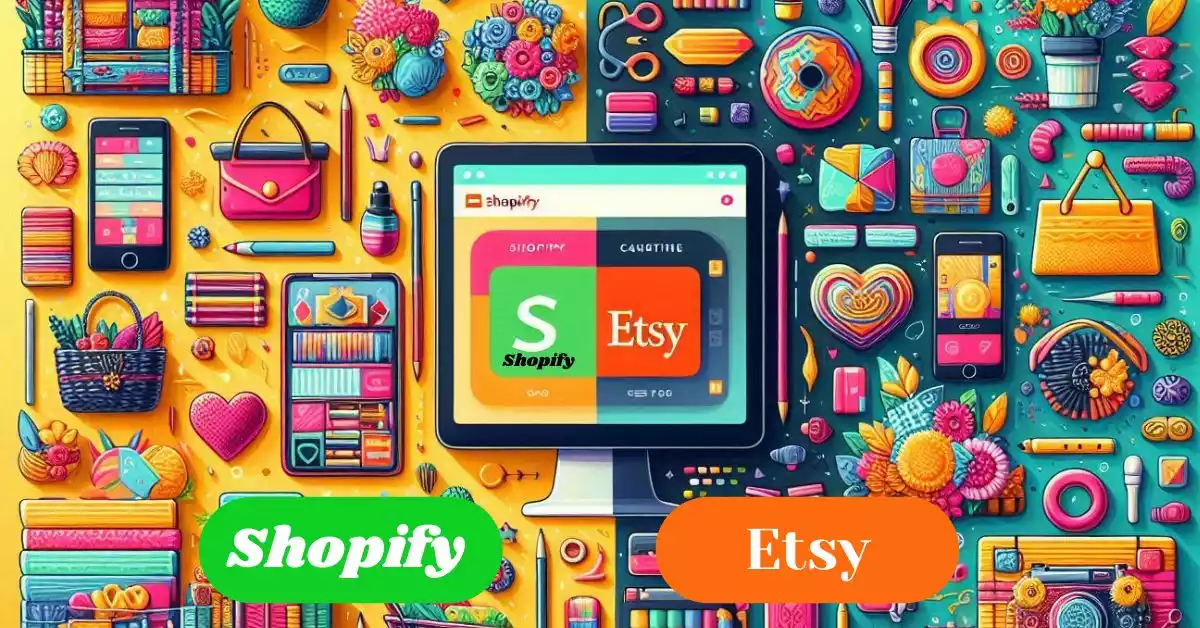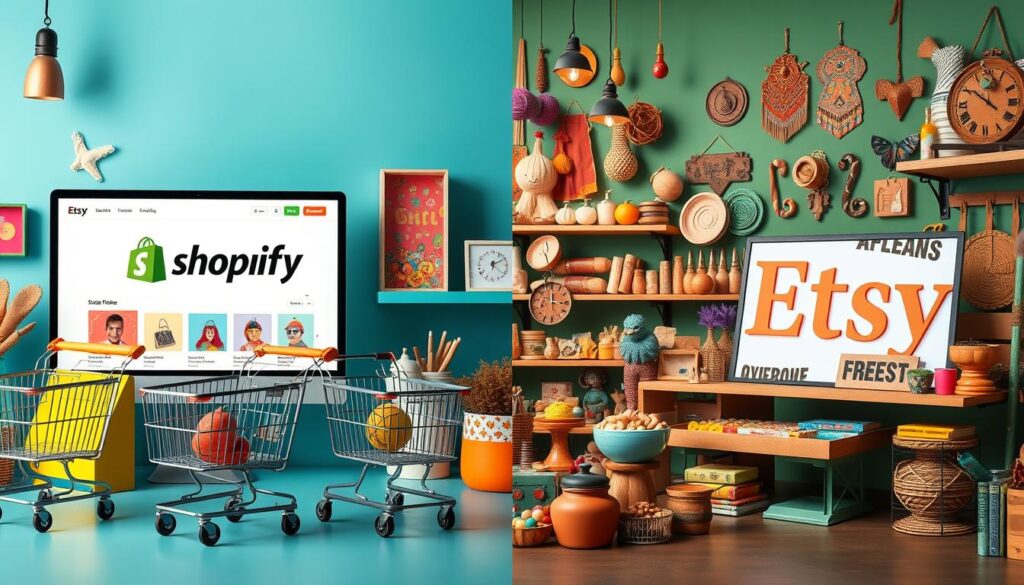
If you’re a creator looking to sell handmade products online, choosing the right platform is essential for success. Both Shopify and Etsy are popular options, but they offer very different benefits. While Etsy is well-known as a marketplace specifically for unique, creative goods, Shopify gives you complete control over a personal online store. In this guide, we’ll explore the pros and cons of Shopify vs Etsy for handmade products so you can decide which platform best fits your business needs. Whether you’re just starting out or ready to expand, understanding each option can make a big difference in reaching your goals.
Did you know over 5.4 million stores use Shopify for online sales? Etsy has about 9 million merchants and 91.5 million customers. These numbers show how big these platforms are in ecommerce. Choosing between Shopify and Etsy for handmade products can be tough.
Each platform has its own features, costs, and benefits. This guide will help you understand these platforms better. It will cover important things like what they offer, how much it costs, and the support you get. Knowing which platform fits your goals is key.
Let’s dive into the details of Shopify and Etsy. This will help you make a smart choice for your handmade business.
Key Takeaways
- Shopify offers extensive scalability and customization options for growing businesses.
- Etsy is known for its simplicity, making it attractive for beginners entering the handmade marketplace.
- Both platforms have unique costs associated with selling, necessitating a careful evaluation to determine which is more financially viable.
- Shopify provides robust marketing tools to help you promote your products, while Etsy benefits from its established audience.
- Understanding the target audience and sales channels of each platform can significantly impact your success.
Introduction to Shopify and Etsy
Both Shopify and Etsy are great for selling online. Shopify is a full e-commerce platform with about 4.5 million stores worldwide. Etsy is a special marketplace for handmade goods, with 95 million customers1.
Shopify started in 2006 and has lots of features for all sellers. Etsy, launched in 2005, focuses on artisans and vintage sellers. It attracts people looking for unique handmade items2.
Linking an Etsy shop with a Shopify store helps sellers keep track of sales and stock. This makes work easier2. Etsy also makes starting a store quick and easy, without needing to spend a lot on design or marketing1.
Knowing what each platform offers is key when deciding between Shopify vs Etsy for your handmade goods.
Understanding the Unique Features of Shopify
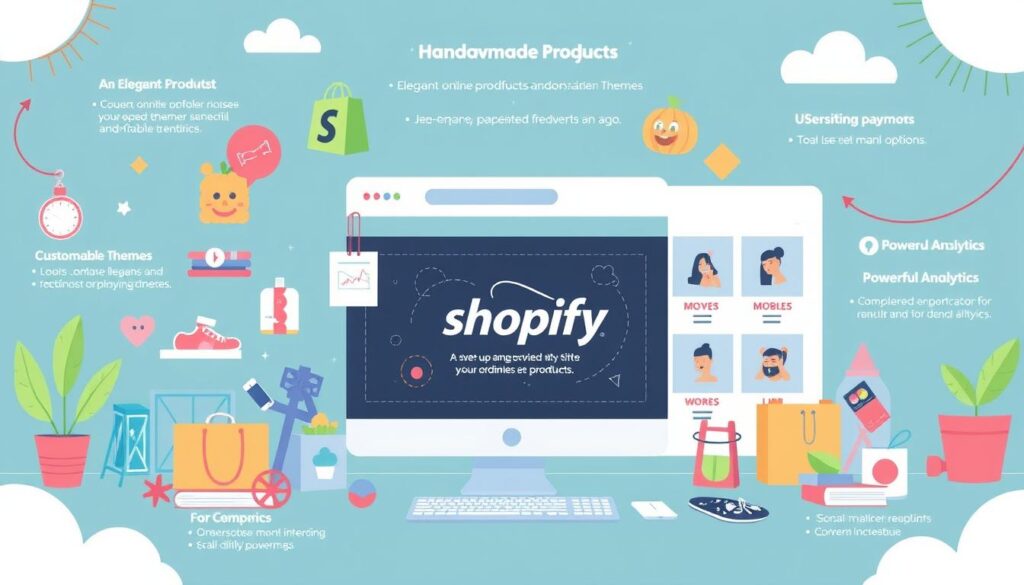
Shopify is a powerful platform for selling handmade items. It has many features for different business needs. Its easy setup lets you quickly start your online store, making it simple for anyone.
User-Friendly Interface and Setup
The user-friendly setup of Shopify makes it easy for creators. You can set up your store in just a few minutes. It guides you through important steps smoothly.
This lets you focus on making your handmade products. It’s all about your creativity.
Customization Options Available
Shopify offers a lot of customization in Shopify to match your brand. You can choose from over 80 different templates to design your store. If you want even more control, you can use HTML and CSS.
This way, you can make your store truly unique. It’s all about your personal touch.
Scalability for Growing Businesses
Shopify is great for growing businesses. It supports your growth with features like multi-channel selling and app integration. This means your online store can grow with your success.
Exploring Etsy’s Marketplace Benefits

Etsy is a top choice for many sellers of handmade goods. It focuses on unique items, connecting you with buyers who love handmade things. This focus helps you get noticed and sell more.
Targeted Audience of Handmade Goods Seekers
With over 90 million buyers, Etsy is a big market for handmade, vintage, and unique items3. It attracts customers who appreciate craftsmanship and unique finds. This is great for your selling strategy.
Ease of Use for Beginners
Etsy is easy to use, perfect for new sellers. You can set up your shop and list items without needing to know a lot of tech stuff. This lets you focus on making things, not figuring out websites.
Low Initial Investment for Selling
Starting to sell on Etsy is cheap, with a $0.20 listing fee for four months and a 6.5% transaction fee on sales4. This low cost is great for new entrepreneurs who want to try out their ideas without spending a lot.
| Etsy Pricing Structure | Cost |
|---|---|
| Listing Fee | $0.20 per item (for 4 months) |
| Transaction Fee | 6.5% of total sale (including shipping) |
| Etsy Plus Fee | $10 per month |
| Potential Audience | Over 90 million buyers |
Shopify vs Etsy for Handmade Products: A Comparison of Costs
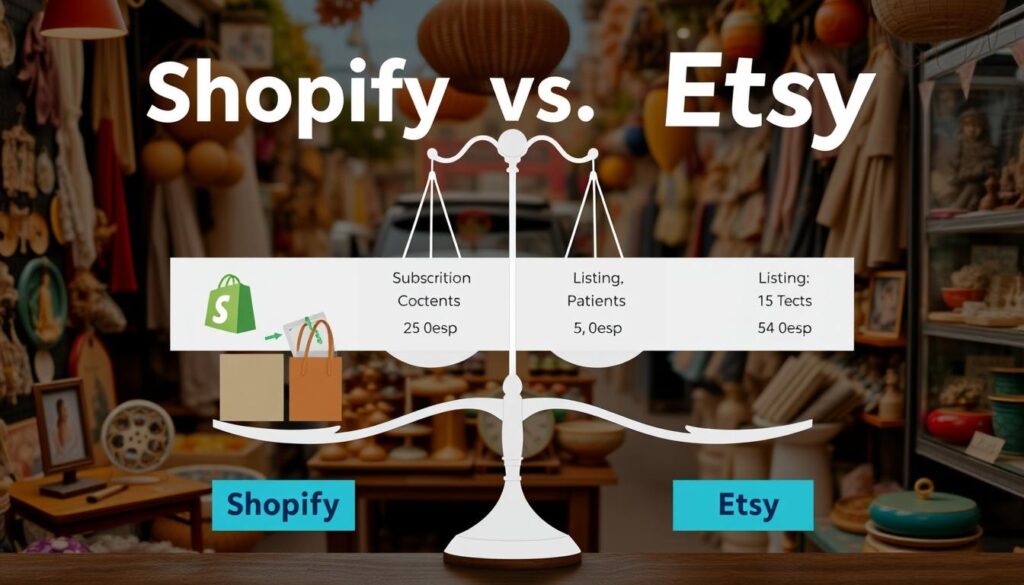
When looking at Shopify vs Etsy, it’s key to know what each offers. This includes their subscription models and transaction fees. Understanding these details helps you choose the best platform for your handmade products.
Shopify Subscription Plans
Shopify has several plans, starting at $29 a month for Basic and going up to $299 for Advanced annually. These Shopify subscription costs include unlimited products, over 8,000 apps, and 24/7 support5. You can also try Shopify for free for three days and get your first month for just $15.
Etsy’s Transaction Fees and Listing Costs
Etsy has a different pricing model. It doesn’t charge monthly fees for the basic plan but has listing and transaction fees. Listing a product costs $0.20, and transaction fees are 5% of the sale price plus $0.25 per transaction for U.S. sellers5. The Etsy Plus plan is $10 a month after a 30-day trial, offering more features like listing credits and ads5.
| Platform | Monthly Cost | Listing Fee | Transaction Fee | Trial Offer |
|---|---|---|---|---|
| Shopify | $29 – $299 | None | Starts at 2.4% + 30 cents | 3-day free trial + first month $1 |
| Etsy | Free basic + $10 (Plus) | $0.20 per listing | 5% of sale price + 3% + $0.25 | 30-day free trial (Plus) |
In comparing handmade products, Etsy might seem cheaper at first. But, Etsy fees can add up, making Shopify’s flat rate more cost-effective for high sales. Think about your business goals and sales before choosing a platform6.
Sales Features and Tools on Each Platform
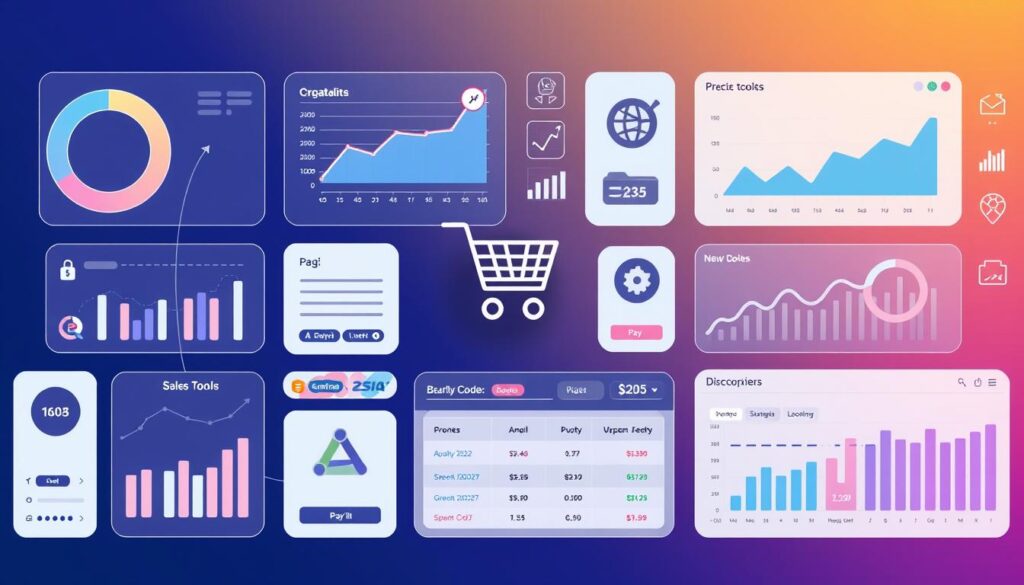
Knowing about sales tools on Shopify and selling features on Etsy is key when picking a platform for your handmade items. Shopify is known for its wide range of ecommerce tools. It helps with managing stock, recovering lost sales, and selling on many channels. This is great for businesses looking to grow and sell more.
Etsy, on the other hand, is simpler. It has a Seller app for basic sales and ads. But, it’s not as detailed as Shopify. For example, Etsy charges a 3% transaction fee and $0.25 per sale, plus listing fees of $0.20 that last four months7. Shopify’s fees start at 2.9% plus $0.30 per online sale8.
Both platforms meet different seller needs. Shopify is best for those wanting lots of ecommerce features and customization. Etsy is good for sellers focusing on niche markets with handmade items. The best choice depends on your business model and what you need to succeed.
Choose wisely based on your sales needs and future goals.
Users should think about these features to match their business goals and how they want to engage with customers.
Look at the costs of each platform when comparing sales tools on Shopify and selling features on Etsy. Whether you choose Shopify’s advanced tools or Etsy’s community focus, both can help you in the handmade market.
Marketing Capabilities of Shopify vs Etsy

When you’re looking to sell handmade items, knowing how Shopify and Etsy market is key. Shopify gives you tools to boost your sales, while Etsy uses its big market to draw in buyers. Each platform has its own strengths for selling handmade goods.
Shopify’s Marketing Tools Overview
Shopify offers many marketing tools to help you get noticed and keep customers coming back. You get SEO, email marketing, and detailed analytics to connect with your audience. These tools help you reach more people and grow your online shop.
Shopify also lets you connect with other platforms easily. This is great for building a strong brand and reaching different customers. It’s perfect for businesses looking to grow and connect with more people.
Etsy’s Built-In Traffic and Marketing Benefits
Etsy is great for sellers who want to start selling easily. It has about 92 million customers every year, ready to buy. Etsy focuses on handmade, vintage, and craft supplies, so you can find your niche easily.
Etsy also makes it simple to advertise your items. This means more people see your products, helping drive traffic to your handmade goods. It’s a good choice for sellers who want to focus on a specific market.
| Feature | Shopify | Etsy |
|---|---|---|
| Monthly Fees | $5 to $299, depending on the plan | Free plan and a $10/month Plus plan |
| Transaction Fees | 2.5% to 2.9% with varied payment gateways | 6.5% plus a 20-cent fee per listed product |
| Built-in Audience | Requires marketing to generate traffic | Approximately 92 million annual customers |
| Supported Payment Platforms | Various, no fees with Shopify Payments | Transaction fees apply for credit card payments |
| Advertising Options | Flexible and robust marketing integrations | Simple advertising options available |
“Etsy’s established marketplace allows sellers to tap into a massive audience without extensive marketing efforts.”9
“Shopify provides more advanced multilingual and multi-currency features compared to Etsy.”7
Security and Support: A Key Consideration

Choosing between Shopify and Etsy means looking at their security and support. Shopify is known for its strong customer support. It offers help 24/7 through chat, phone, and a big help center. This helps sellers grow their brands safely.
Shopify has millions of businesses using it every day10. It keeps stores safe with SSL certificates, fraud detection, and two-factor authentication. These features give sellers peace of mind.
Shopify’s Customer Support Features
Shopify is dedicated to helping sellers. Its help center has lots of tutorials and FAQs. This means sellers can solve problems easily without feeling lost.
Etsy’s Security Measures for Sellers
Etsy focuses on keeping transactions safe. While Etsy’s support isn’t as extensive as Shopify’s, it has a good Help Center. Here, sellers can find info on keeping their items safe.
Etsy charges $0.20 per item listed, renewed every four months or when sold11. It also takes a 6.5% fee on sales, including shipping. These fees help Etsy keep its marketplace safe and supportive for artisans.
When to Choose Shopify over Etsy

Choosing the right platform for your business is key. If you want to create a unique online presence, choosing Shopify vs Etsy might favor Shopify. Shopify lets you customize your shop’s look, content, and customer experience deeply.
Expanding Your Brand Identity
Shopify offers more customization options for a unique brand identity. You can make a store that speaks to your audience, building trust and loyalty. It also helps grow your brand with tools for marketing and improving customer relationships.
Need for More Control Over Sales Channels
Shopify gives you more control over sales channels, which is important for your business. It supports not just handmade products but also digital goods and wholesale sales. If you want to sell through various channels, Shopify is better than Etsy.
In short, if you aim to boost your brand on Shopify and control your sales better, Shopify is the better choice. Remember these points when deciding between choosing Shopify vs Etsy to make the right choice121314.
When Etsy is the Right Choice

Choosing the right platform for your handmade goods is key. Starting with Etsy lets you enter a marketplace known for unique items. It’s easy to use and connects you with people looking for special products.
Beginning Your Handmade Journey
Starting with Etsy means you’ll quickly reach customers who love handmade goods. Since 2005, Etsy has been a go-to for artisans and crafters12. With 66,478 live websites, you’ll join a lively community of sellers15.
This community is great for new sellers. It requires less money to start, easing the stress of launching a store.
Specializing in Handmade or Vintage Products
Choosing Etsy for handmade or vintage items is smart. The platform’s built-in traffic can boost your sales fast. It attracts customers who love crafts and custom items12.
Etsy’s fees are low, with just $0.20 per listing and a 3-4% transaction fee. This makes it easy for sellers to test the market15
Take the next step in your handmade business journey! Whether you’re drawn to Etsy’s creative marketplace or want control of your own Shopify store, choosing the right platform is key. Ready to make the best choice for your business? Dive in, compare, and start selling with confidence today!
Conclusion
When deciding where to sell handmade products online, Shopify and Etsy have different benefits. Shopify gives you full control over your brand and marketing tools. It starts at $29 a month. Etsy, on the other hand, is cheaper, with a 20-cent listing fee and a 6.5% sale fee1617.
Etsy is great for finding lots of customers, making it perfect for new sellers. It’s easy to start and doesn’t cost much each month17. Shopify, though, is better for those who want to grow big. It lets you list as many products as you want and customize your site with over 100 themes17.
Choosing the best place to sell handmade items depends on what you want. Think about what’s important to you: cost, ease of use, or growing your business. Make a choice that fits your goals for success online16.
FAQ
What are the main differences between Shopify and Etsy for selling handmade products?
Shopify and Etsy cater to different needs. Shopify lets you fully customize your store and brand. Etsy, on the other hand, connects you with buyers looking for unique items.
Shopify has many sales tools and marketing options. Etsy, while offering less, brings in more traffic to your store.
Which platform is more cost-effective for selling crafts online?
Etsy is cheaper to start with, with a $0.20 listing fee and a 6.5% transaction fee. But, as sales grow, so do fees. Shopify has monthly plans from $29 to $299, which might be better for bigger sales.
Can I customize my online store on both platforms?
Yes, you can customize your store on both platforms. Shopify lets you change themes and use HTML/CSS for more control. Etsy limits customization to listing details, with less design control.
How do marketing capabilities differ between Shopify and Etsy?
Shopify has many marketing tools like SEO, email marketing, and analytics. Etsy, while offering less, brings in more traffic. This makes it easier to reach more people without much effort.
What security measures do Shopify and Etsy provide?
Shopify focuses on security with SSL certificates, fraud detection, and two-factor authentication. It also offers 24/7 support. Etsy ensures secure transactions but has limited direct support.
Both platforms keep users safe, but Shopify provides more support.
Is it easy to start selling on Shopify and Etsy?
Yes, both platforms are easy to use. Shopify helps you set up your store quickly. Etsy is great for beginners, making listing and managing inventory simple.
Which platform is better if I plan to expand my product range?
Shopify is better for expanding your product range. It lets you sell different types of products, not just handmade items. Its features support growth and diversification.
Source Links
- https://www.putler.com/shopify-vs-etsy/ – Shopify vs Etsy – Should You Choose One or Both?
- https://www.shopify.com/blog/etsy-and-shopify – Etsy and Shopify: How to Use Both To Grow Your Business (2024) – Shopify
- https://juphy.com/blog/shopify-vs-etsy – Shopify vs. Etsy: A Comprehensive Comparison – Juphy
- https://pagefly.io/blogs/shopify/shopify-vs-etsy – Shopify vs Etsy: 2024 Comparison Backed by Merchant Insights
- https://www.forbes.com/advisor/business/software/shopify-vs-etsy/ – Shopify Vs. Etsy: Which One Is Best For Your Business?
- https://www.shopify.com/compare/shopify-vs-etsy – Shopify vs. Etsy | Comparison
- https://www.alphaservesp.com/blog/shopify-vs-etsy-which-is-better-for-your-business – Shopify vs Etsy: Which is Better for Your Business
- https://litextension.com/blog/shopify-vs-etsy/ – Shopify vs Etsy: Which is Better to Sell on? [2024]
- https://www.linkedin.com/pulse/shopify-vs-etsy-which-better-selling-online-style-factory-bzc0e – Shopify vs Etsy — Which is Better for Selling Online?
- https://www.charleagency.com/articles/shopify-vs-etsy/ – Shopify vs Etsy – Which is best for selling online?
- https://amasty.com/blog/shopify-vs-etsy/ – Shopify vs. Etsy: A Decision-Making Guide
- https://www.badasscreatives.com/blog/etsy-or-shopify-artists-handmade-business – Etsy or Shopify: Which Is Best for Artists & Handmade Businesses? — Badass Creatives
- https://www.especial.digital/blog/shopify-vs-etsy-vs-etsy-pattern – Shopify VS Etsy VS Etsy Pattern
- https://www.getmesa.com/blog/why-having-shopify-and-etsy-is-better-together/ – Etsy vs Shopify – Why having Shopify and Etsy is better together
- https://www.shopping-cart-migration.com/must-know-tips/etsy-vs-shopify-comparison-marketplace-standalone – Shopify vs Etsy: Your Ultimate Guide ✅ Cart2Cart™
- https://www.nerdwallet.com/article/small-business/shopify-vs-etsy-which-should-you-use – Shopify vs. Etsy 2023 Comparison – NerdWallet
- https://www.printseekers.com/blog-post/shopify-vs-etsy – Shopify vs Etsy: which one is better? | Printseeekers
